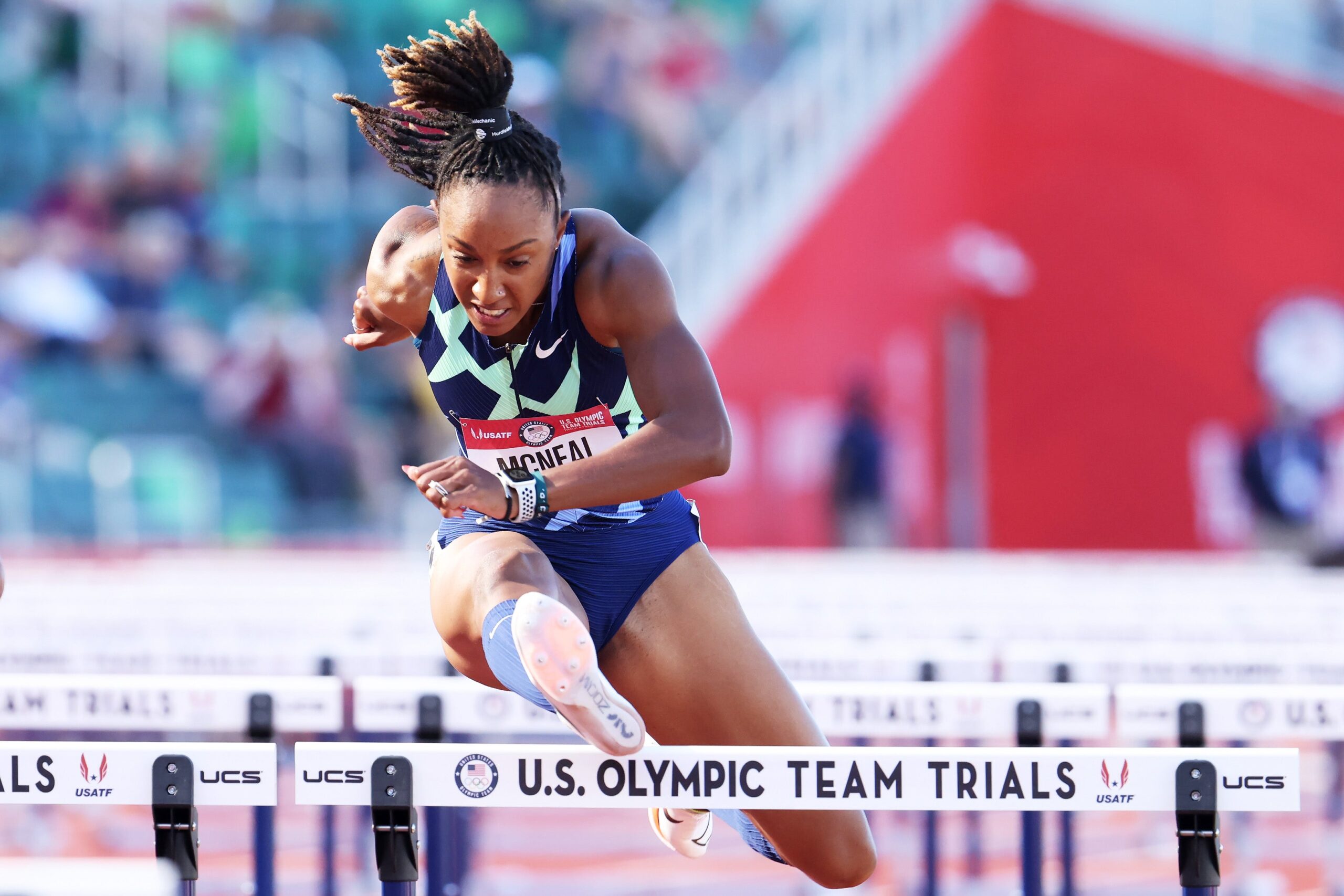After qualifying at the U.S. Olympic Trials last month, Brianna McNeal should be defending her 100-meter hurdles championship in Tokyo later this month. But due to a brazen lack of compassion on behalf of governing bodies for the Olympic Games, she won’t get the chance.
On Friday, the Court of Arbitration for Sport denied the 29-year-old gold medalist’s appeal of a five-year ban for violating anti-doping policies. The ban, which was placed upon McNeal last month, initially stemmed from her missing a doping test in January 2020. McNeal explained to The New York Times that she missed the test because she was recovering from a recent abortion.
Suggested Reading
From the Times:
McNeal has not been accused of doping. Several flaws in the documentation she submitted to prove that she had an abortion are the reason for her ban.
On Jan. 12, 2020, a drug tester knocked on McNeal’s door but got no answer. Nor did anyone answer her phone. Eighteen days later, the Athletics Integrity Unit, which investigates doping in track and field, asked McNeal to explain. She was not required to answer. She had missed only one test in a 12-month period, and it takes three to trigger a doping violation.
McNeal said in the interviews this week that she wanted to be transparent with the investigators, so she explained that she had undergone “a surprise medical procedure” that had left her medicated and in bed. Wishing to protect her privacy, she did not give more details. But she requested a doctor’s note from the abortion clinic confirming an unnamed medical procedure.
When the note came about a month after the abortion, McNeal said, she mistakenly thought the clinic got the date of the procedure wrong. So she changed the date from Jan. 10, 2020, two days before her missed drug test, to Jan. 11.
The Athletics Integrity Unit noticed the change and asked for further documentation. McNeal submitted two more notes from the same doctor, changing the date on both of them. Investigators saw that and asked for her medical records from the clinic. McNeal sent the documents to prove she wasn’t lying about the procedure. Investigators then saw that the date of the procedure was, in fact, Jan. 10, and that she had terminated a pregnancy.
McNeal told the Times that World Athletics–which is the global governing body for track and field–didn’t believe she was “so traumatized by the abortion that she got the date of the procedure wrong” because she was still posting on social media and competing in the following weeks. McNeal also said she was criticized by investigators looking into her case for seeing a spiritual adviser when she was depressed about the abortion instead of going to a psychiatrist.
More from the Times:
“I told them, ‘Oh, really? For me, growing up in the Black community, that’s how we cope with everything — we go to church and we talk to our pastor or spiritual adviser,” she said. “I just feel like they have not been compassionate at all.”
McNeal said that as a Christian, she felt guilt about the abortion, which she underwent so she could compete in the 2020 Games. She said she was even more crushed when the Games were postponed until 2021, because the delay meant she could have had the baby after all.
McNeal had been so shaken and disoriented by the abortion, she said, that it didn’t occur to her that changing the date would be a bad thing.
Because the five-year ban was upheld, McNeal can’t compete in either the Tokyo Olympics or the Paris Olympics in 2024. All of her competitive results from February 13, 2020 to August 14, 2020 will be disqualified and she must return any “medals, titles, points, prize money and prizes” she earned during that time period.
This decision comes after a string of setbacks that Black women who were anticipating their participation in the Tokyo Games have faced in the weeks before the opening ceremonies. Sha’Carri Richardson can’t run in the 100-meter race because she recently tested positive for marijuana, which she took responsibility for and acknowledged that her mother’s recent death and pressure to meet expectations played a role in her decision to use marijuana.
There’s also the case of Namibian sprinters Christine Mbomba and Beatrice Masilingi, who were both ruled ineligible to run the women’s 400 meters because they both have naturally high testosterone levels. Black swimmers, like United Kingdom’s Alice Dearing, can’t wear caps that accommodate for natural hair because they don’t follow “the natural form of the head.”
McNeal spoke out against the court’s decision on Twitter and described how she “listened to white European men tell me how my experience doesn’t match with their perspective” and that “instead of being met with some sort of compassion and understanding, I was being interrogated and stigmatized.”
McNeal continued by saying that while she didn’t want to publicly disclose information about her abortion to officials, she felt that she didn’t have a choice due to their initial response to her missed test. She said that after they learned about her abortion, they forced her to “relive this hellish experience” instead of simply penalizing her for the test and moving on.
“As a clean athlete, I do not feel protected by this system, but I guess that my feelings are irrelevant, because the system just took away my career. I am grateful for everybody who has shown me support and compassion, but I will never recover from this heartbreak.”
Olympic officials need to do better. And McNeal should be in Tokyo this year.
Straight From 
Sign up for our free daily newsletter.


